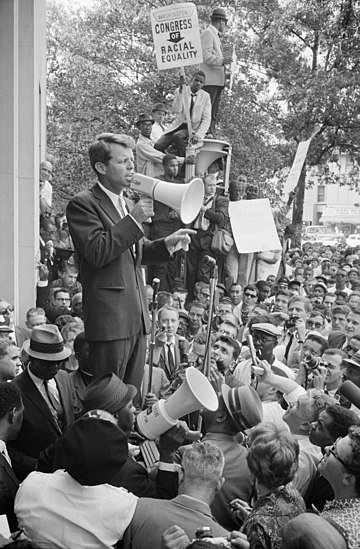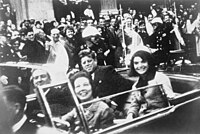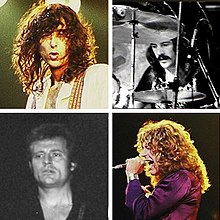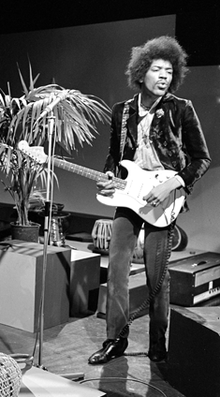Portal:1960s
The 1960s Portal
The 1960s became synonymous with the new, radical, and subversive events and trends of the period. In Africa the 1960s was a period of radical political change as 32 countries gained independence from their European colonial rulers. Some commentators have seen in this era a classical Jungian nightmare cycle, where a rigid culture, unable to contain the demands for greater individual freedom, broke free of the social constraints of the previous age through extreme deviation from the norm. Christopher Booker charts the rise, success, fall/nightmare and explosion in the London scene of the 1960s. However, this alone does not explain the mass nature of the phenomenon. Several nations such as the U.S., France, Germany and Britain turned to the left in the early and mid 1960s. In the United States, John F. Kennedy, a Keynesian and staunch anti-communist, pushed for social reforms. His assassination in 1963 was a stunning shock. Liberal reforms were finally passed under Lyndon B. Johnson including civil rights for African Americans and healthcare for the elderly and the poor. Despite his large-scale Great Society programs, Johnson was increasingly reviled by the New Left at home and abroad. The heavy-handed American role in the Vietnam War outraged student protestors across the globe, as they found peasant rebellion typified by Ho Chi Minh and Che Guevara more appealing. Italy formed its first left-of-center government in March 1962 with a coalition of Christian Democrats, Social Democrats, and moderate Republicans. Socialists joined the ruling block in December 1963. In Britain, the Labour Party gained power in 1964. In Brazil, João Goulart became president after Jânio Quadros resigned. This is a Featured article, which represents some of the best content on English Wikipedia..
The Freewheelin' Bob Dylan is the second studio album by the American singer-songwriter Bob Dylan, released on May 27, 1963, by Columbia Records. Whereas his self-titled debut album Bob Dylan had contained only two original songs, this album represented the beginning of Dylan's writing contemporary lyrics to traditional melodies. Eleven of the thirteen songs on the album are Dylan's original compositions. It opens with "Blowin' in the Wind", which became an anthem of the 1960s, and an international hit for folk trio Peter, Paul and Mary soon after the release of the album. The album featured several other songs which came to be regarded as among Dylan's best compositions and classics of the 1960s folk scene: "Girl from the North Country", "Masters of War", "A Hard Rain's a-Gonna Fall" and "Don't Think Twice, It's All Right". Dylan's lyrics embraced news stories drawn from headlines about the ongoing civil rights movement and he articulated anxieties about the fear of nuclear warfare. Balancing this political material were love songs, sometimes bitter and accusatory, and material that features surreal humor. Freewheelin' showcased Dylan's songwriting talent for the first time, propelling him to national and international fame. The success of the album and Dylan's subsequent recognition led to his being named as "Spokesman of a Generation", a label Dylan repudiated. (Full article...)This is a Good article, an article that meets a core set of high editorial standards.
Led Zeppelin were an English rock band formed in London in 1968. The group comprised vocalist Robert Plant, guitarist Jimmy Page, bassist and keyboardist John Paul Jones, and drummer John Bonham. With a heavy, guitar-driven sound, they are cited as one of the progenitors of hard rock and heavy metal, although their style drew from a variety of influences, including blues and folk music. Led Zeppelin have been credited as significantly impacting the nature of the music industry, particularly in the development of album-oriented rock (AOR) and stadium rock. Originally named the New Yardbirds, Led Zeppelin signed a deal with Atlantic Records that gave them considerable artistic freedom. Initially unpopular with critics, they achieved significant commercial success with eight studio albums over ten years. Their 1969 debut, Led Zeppelin, was a top-ten album in several countries and featured such tracks as "Good Times Bad Times", "Dazed and Confused" and "Communication Breakdown". Led Zeppelin II (1969) was their first number-one album, and yielded "Whole Lotta Love" and "Ramble On". In 1970, they released Led Zeppelin III which featured "Immigrant Song". Their untitled fourth album, commonly known as Led Zeppelin IV (1971), is one of the best-selling albums in history with 37 million copies sold. The album includes "Black Dog", "Rock and Roll" and "Stairway to Heaven", with the latter being among the most popular and influential works in rock history. Houses of the Holy (1973) yielded "The Song Remains the Same" and "Over the Hills and Far Away". Physical Graffiti (1975), a double album, featured "The Rover" and "Kashmir". (Full article...)Selected picture - United States Attorney General Robert F. Kennedy speaking at a civil rights demonstration organized by the Congress of Racial Equality (CORE) on the steps of the Department of Justice building in June 1963. Kennedy's tenure (1961–64) was easily the period of greatest power for the office; no previous officeholder had enjoyed such clear influence on all areas of policy during an administration. As Attorney General, Kennedy pursued a relentless crusade against organized crime and consistently championed civil rights for African Americans, the latter so much so that he commented, in 1962, that it seemed to envelop almost every area of his public and private life.
Did you know -
Related portalsThis is a Featured article, which represents some of the best content on English Wikipedia..
James Marshall "Jimi" Hendrix (born Johnny Allen Hendrix; November 27, 1942 – September 18, 1970) was an American guitarist, songwriter and singer. Although his mainstream career spanned only four years, he is widely regarded as the greatest and one of the most influential electric guitarists in the history of popular music, and one of the most celebrated musicians of the 20th century. The Rock and Roll Hall of Fame describes him as "arguably the greatest instrumentalist in the history of rock music." Born in Seattle, Washington, Hendrix began playing guitar at age 15. In 1961, he enlisted in the US Army, but was discharged the following year. Soon afterward, he moved to Clarksville, then Nashville, Tennessee, and began playing gigs on the chitlin' circuit, earning a place in the Isley Brothers' backing band and later with Little Richard, with whom he continued to work through mid-1965. He then played with Curtis Knight and the Squires before moving to England in late 1966 after bassist Chas Chandler of the Animals became his manager. Within months, Hendrix had earned three UK top ten hits with his band the Jimi Hendrix Experience: "Hey Joe", "Purple Haze", and "The Wind Cries Mary". He achieved fame in the US after his performance at the Monterey Pop Festival in 1967, and in 1968 his third and final studio album, Electric Ladyland, reached number one in the US. The double LP was Hendrix's most commercially successful release and his only number one album. The world's highest-paid rock musician, he headlined the Woodstock Festival in 1969 and the Isle of Wight Festival in 1970 before his accidental death in London from barbiturate-related asphyxia in September 1970. (Full article...)This is a Good article, an article that meets a core set of high editorial standards.
Sir Michael Philip Jagger (born 26 July 1943) is an English singer. He is the front man and one of the founder members of the rock band the Rolling Stones. Jagger has written most of the band's songs alongside lead guitarist Keith Richards; their songwriting partnership is one of the most successful in history, and they continue to collaborate musically. His career has spanned over six decades, and he has been widely described as one of the most popular and influential front men in the history of rock music. His distinctive voice and energetic live performances, along with Richards' guitar style, have been the Rolling Stones' trademark throughout the band's career. Jagger gained notoriety for his romantic involvements and illicit drug use, and has often been portrayed as a countercultural figure. Jagger was born and grew up in Dartford. He studied at the London School of Economics before abandoning his studies to focus on his career with the Rolling Stones. In the late 1960s, Jagger starred in the films Performance (1970) and Ned Kelly (1970), to mixed receptions. Beginning in the 1980s, he released a number of solo works, including four albums and the single "Dancing in the Street", a 1985 duet with David Bowie that reached No. 1 in the UK and Australia and was a top-ten hit in other countries. (Full article...)Selected article -Jefferson Airplane was an American rock band based in San Francisco, California, that became one of the pioneering bands of psychedelic rock. Formed in 1965, the group defined the San Francisco Sound and was the first from the Bay Area to achieve international commercial success. They headlined the Monterey Pop Festival (1967), Woodstock (1969), Altamont Free Concert (1969), and the first Isle of Wight Festival (1968) in England. Their 1967 breakout album Surrealistic Pillow was one of the most significant recordings of the Summer of Love. Two songs from that album, "Somebody to Love" and "White Rabbit", are among Rolling Stone's "500 Greatest Songs of All Time". The October 1966 to February 1970 lineup of Jefferson Airplane, consisting of Marty Balin (vocals), Paul Kantner (guitar, vocals), Grace Slick (vocals, keyboards), Jorma Kaukonen (lead guitar, vocals), Jack Casady (bass), and Spencer Dryden (drums), was inducted into the Rock and Roll Hall of Fame in 1996. Balin left the band in 1971. After 1972, Jefferson Airplane effectively split into two groups. Kaukonen and Casady moved on full-time to their own band, Hot Tuna. Slick, Kantner, and the remaining members of Jefferson Airplane recruited new members and regrouped as Jefferson Starship in 1974, with Balin eventually joining them. Jefferson Airplane received a Grammy Lifetime Achievement Award in 2016. (Full article...)More Did you know (auto generated)
TopicsCategoriesWikiProjects
Associated WikimediaThe following Wikimedia Foundation sister projects provide more on this subject:
Discover Wikipedia using portals |






























